Health Story Assignment: Increase of Cancer Cases in Canada
VerifiedAdded on 2022/11/27
|9
|2102
|332
Report
AI Summary
This report examines the increasing incidence of cancer cases in Canada, attributing the rise to excessive smoking habits. It employs Karl Marx's conflict theory to analyze the issue, highlighting socioeconomic disparities as a key factor. The report argues that the working class is disproportionately affected due to factors like lack of education, awareness, and financial resources, leading to higher rates of substance abuse. It details the impacts of smoking, including cardiovascular diseases, lung diseases, and various cancers, while also discussing the role of nicotine addiction and withdrawal symptoms. The report concludes by emphasizing the need for government intervention through affordable support groups, rehabilitation centers, and educational programs to address the root causes and mitigate the effects of this public health crisis.
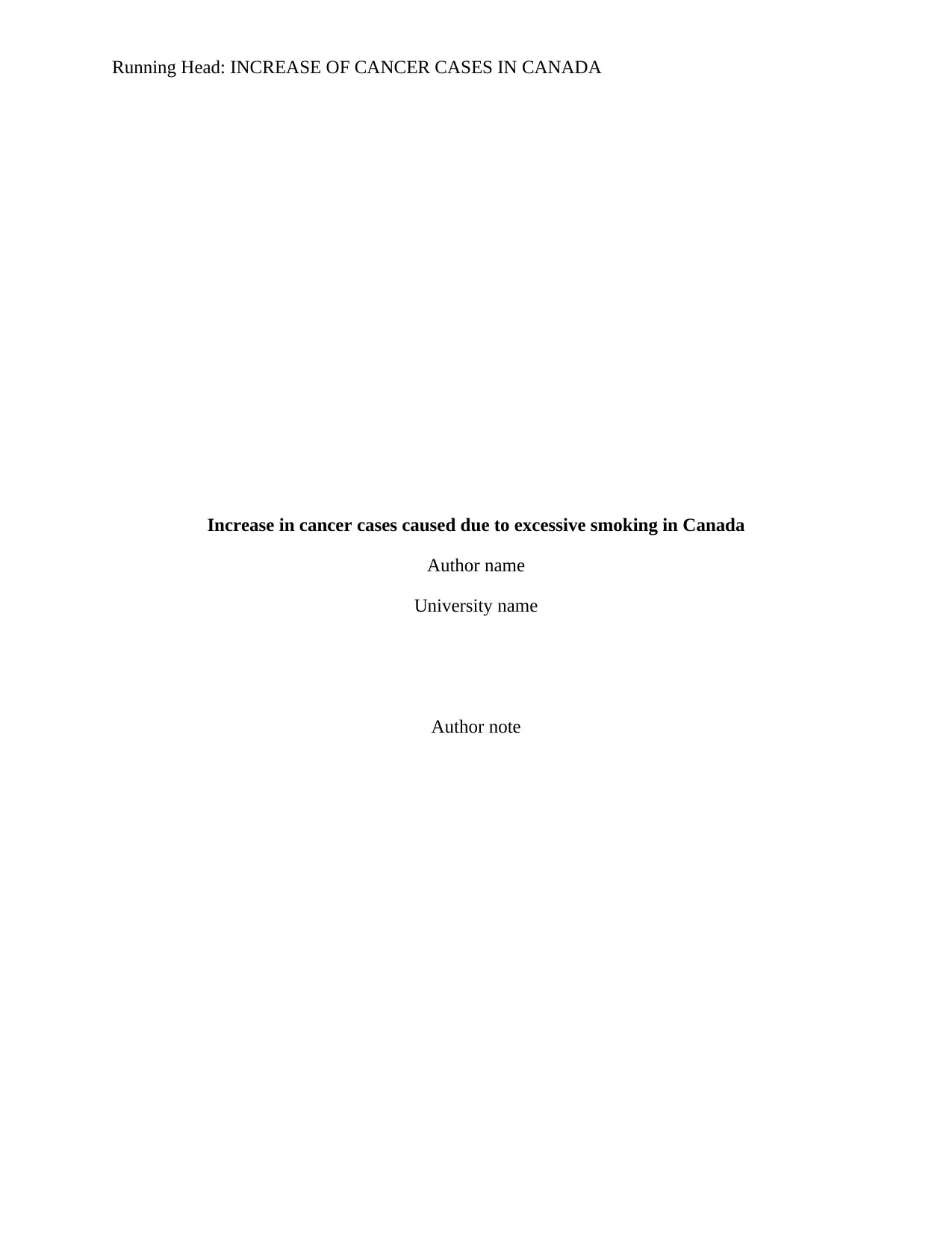
Running Head: INCREASE OF CANCER CASES IN CANADA
Increase in cancer cases caused due to excessive smoking in Canada
Author name
University name
Author note
Increase in cancer cases caused due to excessive smoking in Canada
Author name
University name
Author note
Paraphrase This Document
Need a fresh take? Get an instant paraphrase of this document with our AI Paraphraser
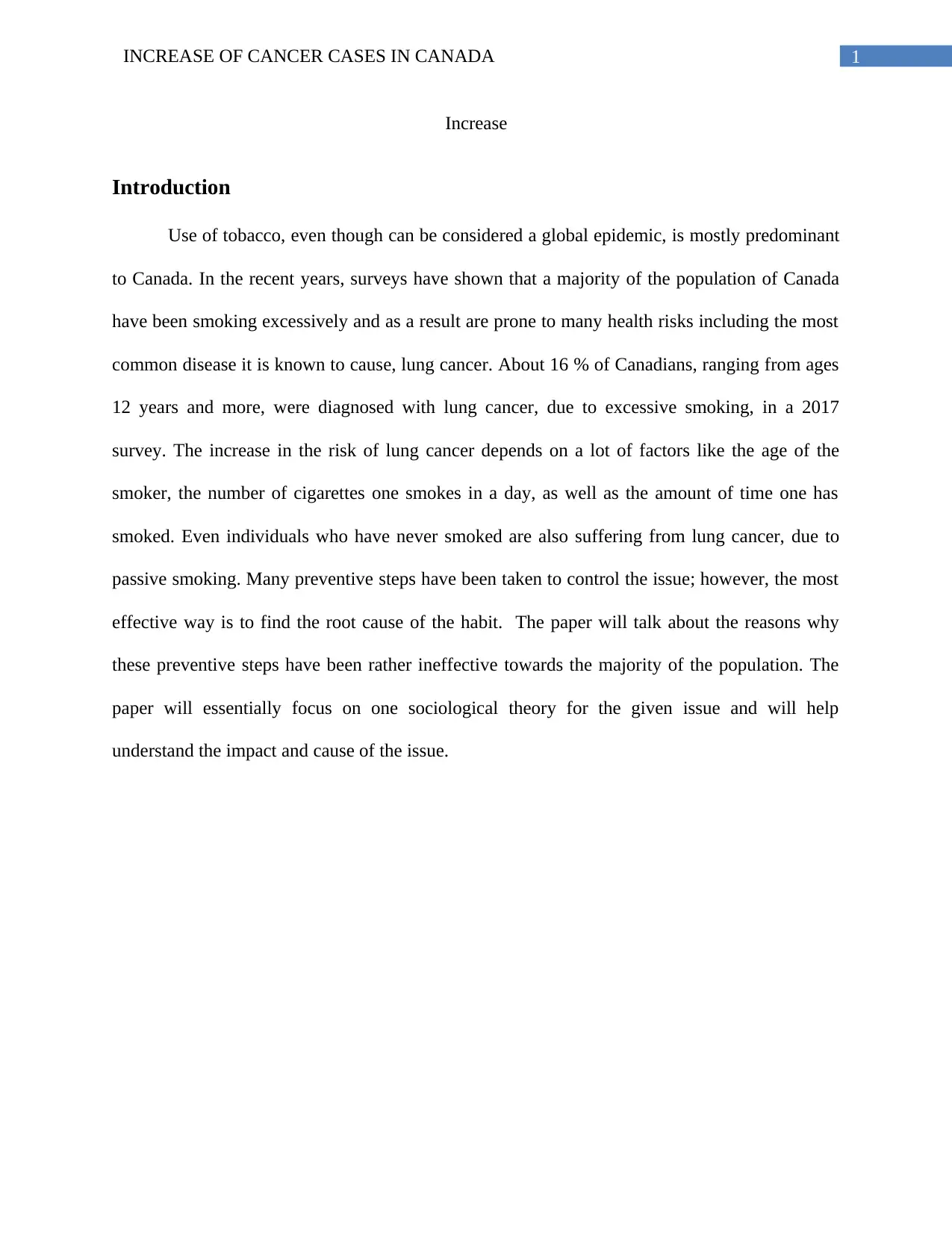
1INCREASE OF CANCER CASES IN CANADA
Increase
Introduction
Use of tobacco, even though can be considered a global epidemic, is mostly predominant
to Canada. In the recent years, surveys have shown that a majority of the population of Canada
have been smoking excessively and as a result are prone to many health risks including the most
common disease it is known to cause, lung cancer. About 16 % of Canadians, ranging from ages
12 years and more, were diagnosed with lung cancer, due to excessive smoking, in a 2017
survey. The increase in the risk of lung cancer depends on a lot of factors like the age of the
smoker, the number of cigarettes one smokes in a day, as well as the amount of time one has
smoked. Even individuals who have never smoked are also suffering from lung cancer, due to
passive smoking. Many preventive steps have been taken to control the issue; however, the most
effective way is to find the root cause of the habit. The paper will talk about the reasons why
these preventive steps have been rather ineffective towards the majority of the population. The
paper will essentially focus on one sociological theory for the given issue and will help
understand the impact and cause of the issue.
Increase
Introduction
Use of tobacco, even though can be considered a global epidemic, is mostly predominant
to Canada. In the recent years, surveys have shown that a majority of the population of Canada
have been smoking excessively and as a result are prone to many health risks including the most
common disease it is known to cause, lung cancer. About 16 % of Canadians, ranging from ages
12 years and more, were diagnosed with lung cancer, due to excessive smoking, in a 2017
survey. The increase in the risk of lung cancer depends on a lot of factors like the age of the
smoker, the number of cigarettes one smokes in a day, as well as the amount of time one has
smoked. Even individuals who have never smoked are also suffering from lung cancer, due to
passive smoking. Many preventive steps have been taken to control the issue; however, the most
effective way is to find the root cause of the habit. The paper will talk about the reasons why
these preventive steps have been rather ineffective towards the majority of the population. The
paper will essentially focus on one sociological theory for the given issue and will help
understand the impact and cause of the issue.
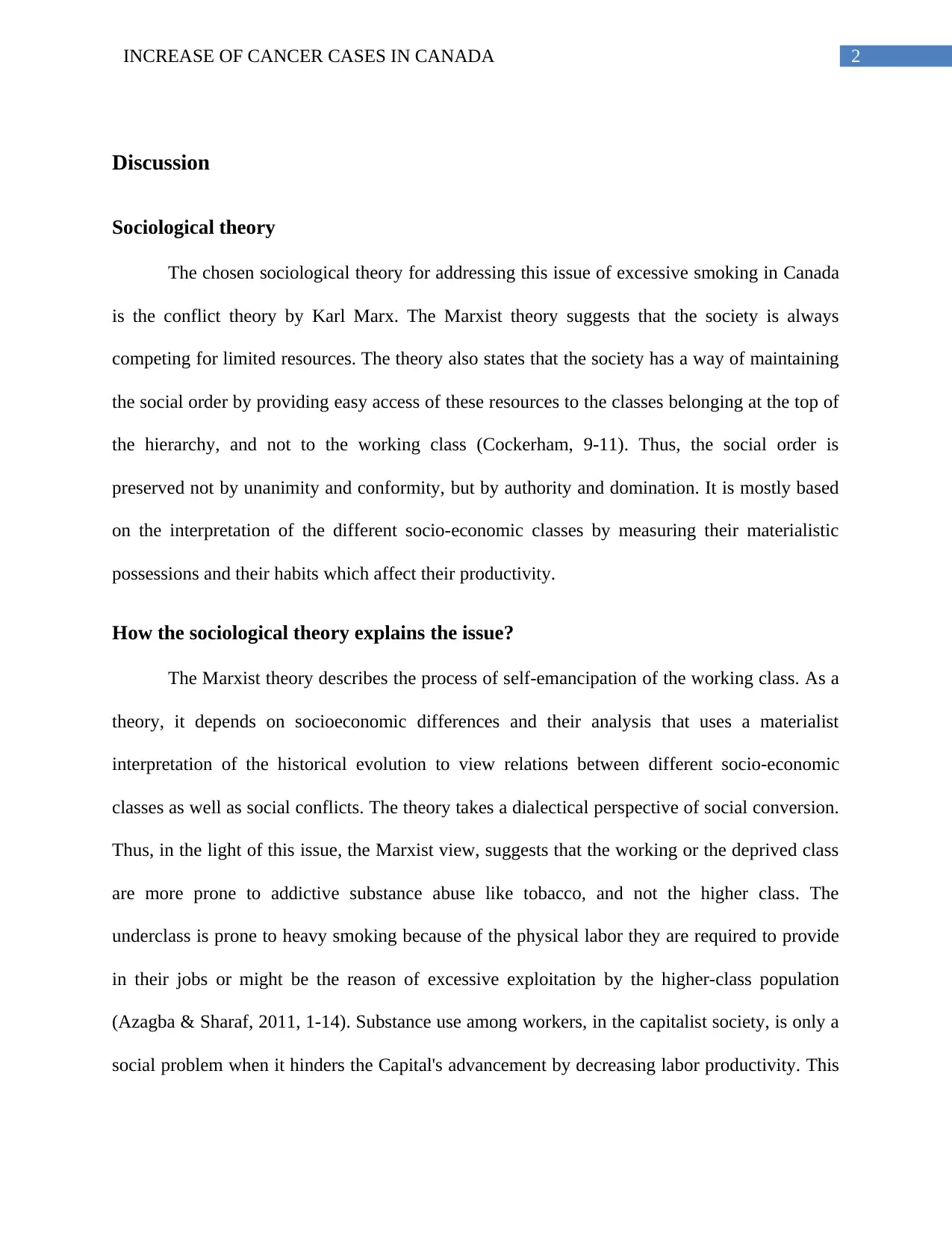
2INCREASE OF CANCER CASES IN CANADA
Discussion
Sociological theory
The chosen sociological theory for addressing this issue of excessive smoking in Canada
is the conflict theory by Karl Marx. The Marxist theory suggests that the society is always
competing for limited resources. The theory also states that the society has a way of maintaining
the social order by providing easy access of these resources to the classes belonging at the top of
the hierarchy, and not to the working class (Cockerham, 9-11). Thus, the social order is
preserved not by unanimity and conformity, but by authority and domination. It is mostly based
on the interpretation of the different socio-economic classes by measuring their materialistic
possessions and their habits which affect their productivity.
How the sociological theory explains the issue?
The Marxist theory describes the process of self-emancipation of the working class. As a
theory, it depends on socioeconomic differences and their analysis that uses a materialist
interpretation of the historical evolution to view relations between different socio-economic
classes as well as social conflicts. The theory takes a dialectical perspective of social conversion.
Thus, in the light of this issue, the Marxist view, suggests that the working or the deprived class
are more prone to addictive substance abuse like tobacco, and not the higher class. The
underclass is prone to heavy smoking because of the physical labor they are required to provide
in their jobs or might be the reason of excessive exploitation by the higher-class population
(Azagba & Sharaf, 2011, 1-14). Substance use among workers, in the capitalist society, is only a
social problem when it hinders the Capital's advancement by decreasing labor productivity. This
Discussion
Sociological theory
The chosen sociological theory for addressing this issue of excessive smoking in Canada
is the conflict theory by Karl Marx. The Marxist theory suggests that the society is always
competing for limited resources. The theory also states that the society has a way of maintaining
the social order by providing easy access of these resources to the classes belonging at the top of
the hierarchy, and not to the working class (Cockerham, 9-11). Thus, the social order is
preserved not by unanimity and conformity, but by authority and domination. It is mostly based
on the interpretation of the different socio-economic classes by measuring their materialistic
possessions and their habits which affect their productivity.
How the sociological theory explains the issue?
The Marxist theory describes the process of self-emancipation of the working class. As a
theory, it depends on socioeconomic differences and their analysis that uses a materialist
interpretation of the historical evolution to view relations between different socio-economic
classes as well as social conflicts. The theory takes a dialectical perspective of social conversion.
Thus, in the light of this issue, the Marxist view, suggests that the working or the deprived class
are more prone to addictive substance abuse like tobacco, and not the higher class. The
underclass is prone to heavy smoking because of the physical labor they are required to provide
in their jobs or might be the reason of excessive exploitation by the higher-class population
(Azagba & Sharaf, 2011, 1-14). Substance use among workers, in the capitalist society, is only a
social problem when it hinders the Capital's advancement by decreasing labor productivity. This
⊘ This is a preview!⊘
Do you want full access?
Subscribe today to unlock all pages.

Trusted by 1+ million students worldwide
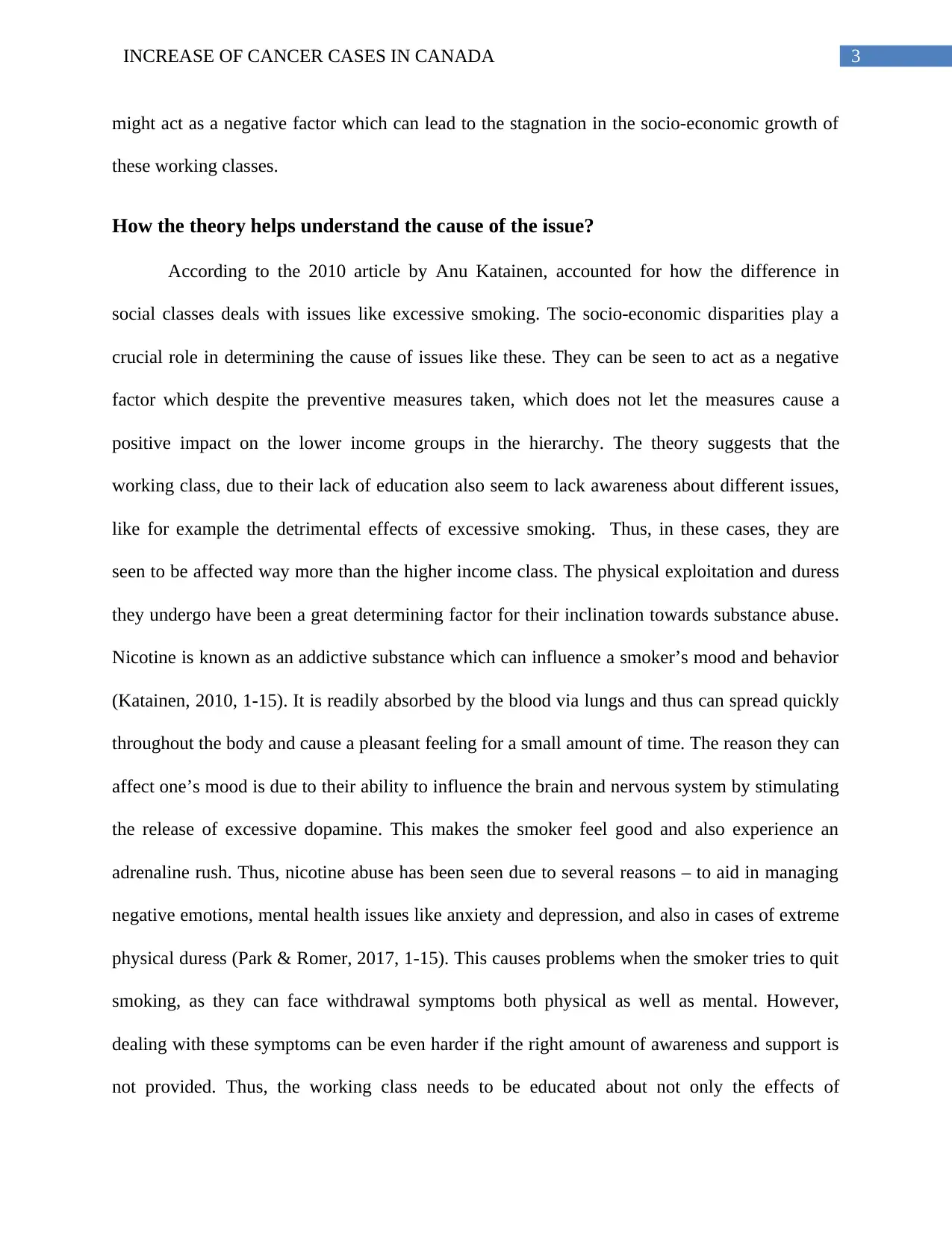
3INCREASE OF CANCER CASES IN CANADA
might act as a negative factor which can lead to the stagnation in the socio-economic growth of
these working classes.
How the theory helps understand the cause of the issue?
According to the 2010 article by Anu Katainen, accounted for how the difference in
social classes deals with issues like excessive smoking. The socio-economic disparities play a
crucial role in determining the cause of issues like these. They can be seen to act as a negative
factor which despite the preventive measures taken, which does not let the measures cause a
positive impact on the lower income groups in the hierarchy. The theory suggests that the
working class, due to their lack of education also seem to lack awareness about different issues,
like for example the detrimental effects of excessive smoking. Thus, in these cases, they are
seen to be affected way more than the higher income class. The physical exploitation and duress
they undergo have been a great determining factor for their inclination towards substance abuse.
Nicotine is known as an addictive substance which can influence a smoker’s mood and behavior
(Katainen, 2010, 1-15). It is readily absorbed by the blood via lungs and thus can spread quickly
throughout the body and cause a pleasant feeling for a small amount of time. The reason they can
affect one’s mood is due to their ability to influence the brain and nervous system by stimulating
the release of excessive dopamine. This makes the smoker feel good and also experience an
adrenaline rush. Thus, nicotine abuse has been seen due to several reasons – to aid in managing
negative emotions, mental health issues like anxiety and depression, and also in cases of extreme
physical duress (Park & Romer, 2017, 1-15). This causes problems when the smoker tries to quit
smoking, as they can face withdrawal symptoms both physical as well as mental. However,
dealing with these symptoms can be even harder if the right amount of awareness and support is
not provided. Thus, the working class needs to be educated about not only the effects of
might act as a negative factor which can lead to the stagnation in the socio-economic growth of
these working classes.
How the theory helps understand the cause of the issue?
According to the 2010 article by Anu Katainen, accounted for how the difference in
social classes deals with issues like excessive smoking. The socio-economic disparities play a
crucial role in determining the cause of issues like these. They can be seen to act as a negative
factor which despite the preventive measures taken, which does not let the measures cause a
positive impact on the lower income groups in the hierarchy. The theory suggests that the
working class, due to their lack of education also seem to lack awareness about different issues,
like for example the detrimental effects of excessive smoking. Thus, in these cases, they are
seen to be affected way more than the higher income class. The physical exploitation and duress
they undergo have been a great determining factor for their inclination towards substance abuse.
Nicotine is known as an addictive substance which can influence a smoker’s mood and behavior
(Katainen, 2010, 1-15). It is readily absorbed by the blood via lungs and thus can spread quickly
throughout the body and cause a pleasant feeling for a small amount of time. The reason they can
affect one’s mood is due to their ability to influence the brain and nervous system by stimulating
the release of excessive dopamine. This makes the smoker feel good and also experience an
adrenaline rush. Thus, nicotine abuse has been seen due to several reasons – to aid in managing
negative emotions, mental health issues like anxiety and depression, and also in cases of extreme
physical duress (Park & Romer, 2017, 1-15). This causes problems when the smoker tries to quit
smoking, as they can face withdrawal symptoms both physical as well as mental. However,
dealing with these symptoms can be even harder if the right amount of awareness and support is
not provided. Thus, the working class needs to be educated about not only the effects of
Paraphrase This Document
Need a fresh take? Get an instant paraphrase of this document with our AI Paraphraser
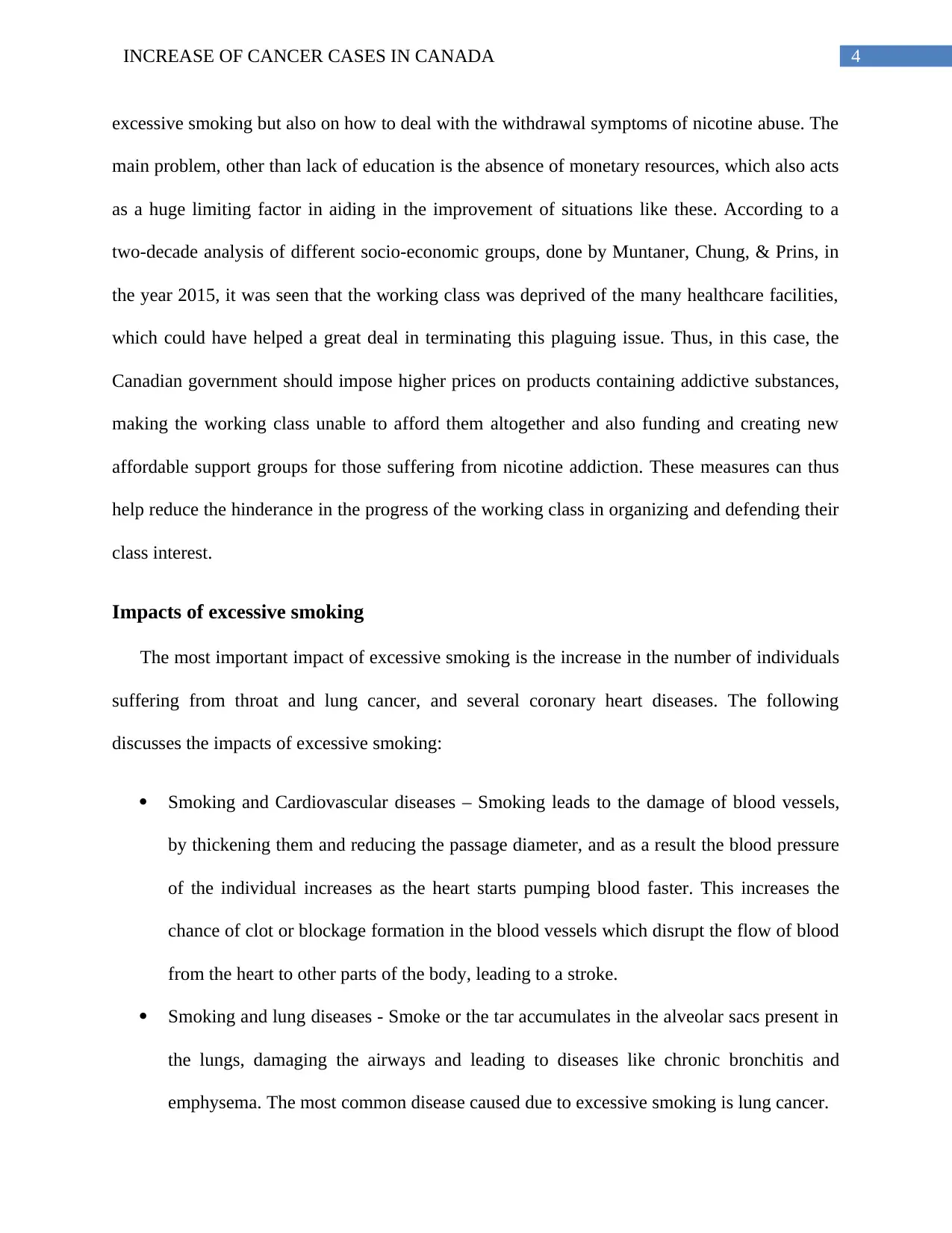
4INCREASE OF CANCER CASES IN CANADA
excessive smoking but also on how to deal with the withdrawal symptoms of nicotine abuse. The
main problem, other than lack of education is the absence of monetary resources, which also acts
as a huge limiting factor in aiding in the improvement of situations like these. According to a
two-decade analysis of different socio-economic groups, done by Muntaner, Chung, & Prins, in
the year 2015, it was seen that the working class was deprived of the many healthcare facilities,
which could have helped a great deal in terminating this plaguing issue. Thus, in this case, the
Canadian government should impose higher prices on products containing addictive substances,
making the working class unable to afford them altogether and also funding and creating new
affordable support groups for those suffering from nicotine addiction. These measures can thus
help reduce the hinderance in the progress of the working class in organizing and defending their
class interest.
Impacts of excessive smoking
The most important impact of excessive smoking is the increase in the number of individuals
suffering from throat and lung cancer, and several coronary heart diseases. The following
discusses the impacts of excessive smoking:
Smoking and Cardiovascular diseases – Smoking leads to the damage of blood vessels,
by thickening them and reducing the passage diameter, and as a result the blood pressure
of the individual increases as the heart starts pumping blood faster. This increases the
chance of clot or blockage formation in the blood vessels which disrupt the flow of blood
from the heart to other parts of the body, leading to a stroke.
Smoking and lung diseases - Smoke or the tar accumulates in the alveolar sacs present in
the lungs, damaging the airways and leading to diseases like chronic bronchitis and
emphysema. The most common disease caused due to excessive smoking is lung cancer.
excessive smoking but also on how to deal with the withdrawal symptoms of nicotine abuse. The
main problem, other than lack of education is the absence of monetary resources, which also acts
as a huge limiting factor in aiding in the improvement of situations like these. According to a
two-decade analysis of different socio-economic groups, done by Muntaner, Chung, & Prins, in
the year 2015, it was seen that the working class was deprived of the many healthcare facilities,
which could have helped a great deal in terminating this plaguing issue. Thus, in this case, the
Canadian government should impose higher prices on products containing addictive substances,
making the working class unable to afford them altogether and also funding and creating new
affordable support groups for those suffering from nicotine addiction. These measures can thus
help reduce the hinderance in the progress of the working class in organizing and defending their
class interest.
Impacts of excessive smoking
The most important impact of excessive smoking is the increase in the number of individuals
suffering from throat and lung cancer, and several coronary heart diseases. The following
discusses the impacts of excessive smoking:
Smoking and Cardiovascular diseases – Smoking leads to the damage of blood vessels,
by thickening them and reducing the passage diameter, and as a result the blood pressure
of the individual increases as the heart starts pumping blood faster. This increases the
chance of clot or blockage formation in the blood vessels which disrupt the flow of blood
from the heart to other parts of the body, leading to a stroke.
Smoking and lung diseases - Smoke or the tar accumulates in the alveolar sacs present in
the lungs, damaging the airways and leading to diseases like chronic bronchitis and
emphysema. The most common disease caused due to excessive smoking is lung cancer.
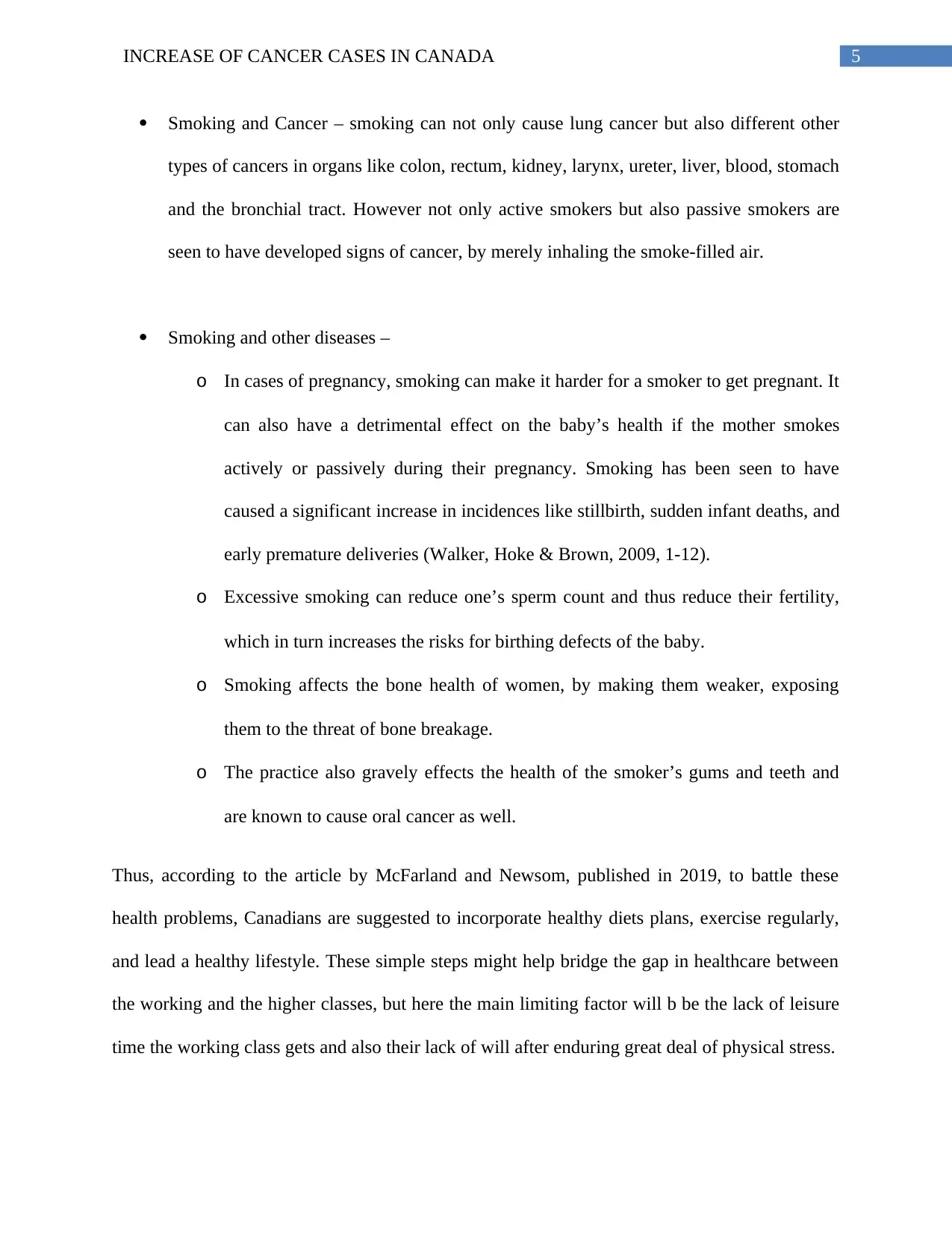
5INCREASE OF CANCER CASES IN CANADA
Smoking and Cancer – smoking can not only cause lung cancer but also different other
types of cancers in organs like colon, rectum, kidney, larynx, ureter, liver, blood, stomach
and the bronchial tract. However not only active smokers but also passive smokers are
seen to have developed signs of cancer, by merely inhaling the smoke-filled air.
Smoking and other diseases –
o In cases of pregnancy, smoking can make it harder for a smoker to get pregnant. It
can also have a detrimental effect on the baby’s health if the mother smokes
actively or passively during their pregnancy. Smoking has been seen to have
caused a significant increase in incidences like stillbirth, sudden infant deaths, and
early premature deliveries (Walker, Hoke & Brown, 2009, 1-12).
o Excessive smoking can reduce one’s sperm count and thus reduce their fertility,
which in turn increases the risks for birthing defects of the baby.
o Smoking affects the bone health of women, by making them weaker, exposing
them to the threat of bone breakage.
o The practice also gravely effects the health of the smoker’s gums and teeth and
are known to cause oral cancer as well.
Thus, according to the article by McFarland and Newsom, published in 2019, to battle these
health problems, Canadians are suggested to incorporate healthy diets plans, exercise regularly,
and lead a healthy lifestyle. These simple steps might help bridge the gap in healthcare between
the working and the higher classes, but here the main limiting factor will b be the lack of leisure
time the working class gets and also their lack of will after enduring great deal of physical stress.
Smoking and Cancer – smoking can not only cause lung cancer but also different other
types of cancers in organs like colon, rectum, kidney, larynx, ureter, liver, blood, stomach
and the bronchial tract. However not only active smokers but also passive smokers are
seen to have developed signs of cancer, by merely inhaling the smoke-filled air.
Smoking and other diseases –
o In cases of pregnancy, smoking can make it harder for a smoker to get pregnant. It
can also have a detrimental effect on the baby’s health if the mother smokes
actively or passively during their pregnancy. Smoking has been seen to have
caused a significant increase in incidences like stillbirth, sudden infant deaths, and
early premature deliveries (Walker, Hoke & Brown, 2009, 1-12).
o Excessive smoking can reduce one’s sperm count and thus reduce their fertility,
which in turn increases the risks for birthing defects of the baby.
o Smoking affects the bone health of women, by making them weaker, exposing
them to the threat of bone breakage.
o The practice also gravely effects the health of the smoker’s gums and teeth and
are known to cause oral cancer as well.
Thus, according to the article by McFarland and Newsom, published in 2019, to battle these
health problems, Canadians are suggested to incorporate healthy diets plans, exercise regularly,
and lead a healthy lifestyle. These simple steps might help bridge the gap in healthcare between
the working and the higher classes, but here the main limiting factor will b be the lack of leisure
time the working class gets and also their lack of will after enduring great deal of physical stress.
⊘ This is a preview!⊘
Do you want full access?
Subscribe today to unlock all pages.

Trusted by 1+ million students worldwide
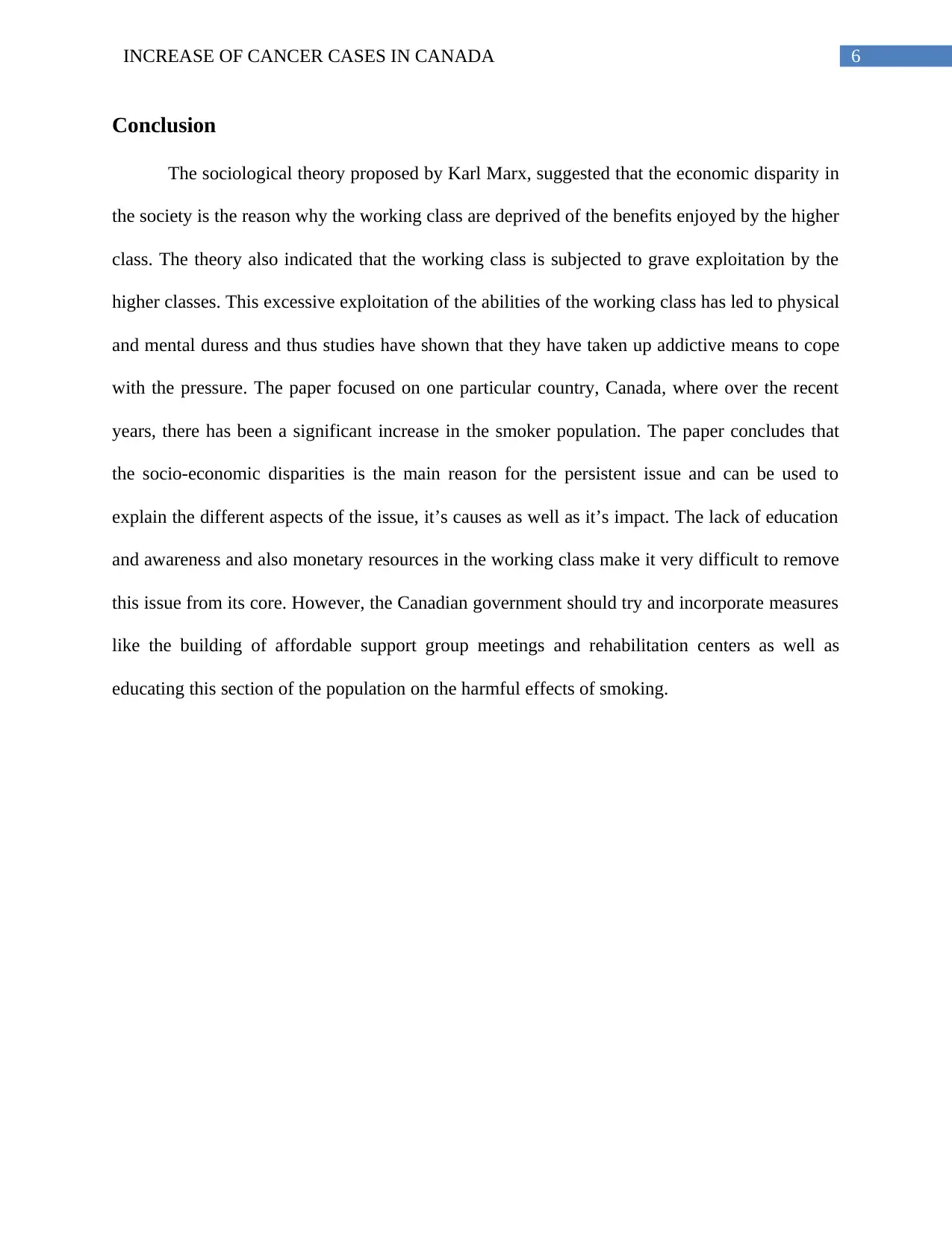
6INCREASE OF CANCER CASES IN CANADA
Conclusion
The sociological theory proposed by Karl Marx, suggested that the economic disparity in
the society is the reason why the working class are deprived of the benefits enjoyed by the higher
class. The theory also indicated that the working class is subjected to grave exploitation by the
higher classes. This excessive exploitation of the abilities of the working class has led to physical
and mental duress and thus studies have shown that they have taken up addictive means to cope
with the pressure. The paper focused on one particular country, Canada, where over the recent
years, there has been a significant increase in the smoker population. The paper concludes that
the socio-economic disparities is the main reason for the persistent issue and can be used to
explain the different aspects of the issue, it’s causes as well as it’s impact. The lack of education
and awareness and also monetary resources in the working class make it very difficult to remove
this issue from its core. However, the Canadian government should try and incorporate measures
like the building of affordable support group meetings and rehabilitation centers as well as
educating this section of the population on the harmful effects of smoking.
Conclusion
The sociological theory proposed by Karl Marx, suggested that the economic disparity in
the society is the reason why the working class are deprived of the benefits enjoyed by the higher
class. The theory also indicated that the working class is subjected to grave exploitation by the
higher classes. This excessive exploitation of the abilities of the working class has led to physical
and mental duress and thus studies have shown that they have taken up addictive means to cope
with the pressure. The paper focused on one particular country, Canada, where over the recent
years, there has been a significant increase in the smoker population. The paper concludes that
the socio-economic disparities is the main reason for the persistent issue and can be used to
explain the different aspects of the issue, it’s causes as well as it’s impact. The lack of education
and awareness and also monetary resources in the working class make it very difficult to remove
this issue from its core. However, the Canadian government should try and incorporate measures
like the building of affordable support group meetings and rehabilitation centers as well as
educating this section of the population on the harmful effects of smoking.
Paraphrase This Document
Need a fresh take? Get an instant paraphrase of this document with our AI Paraphraser
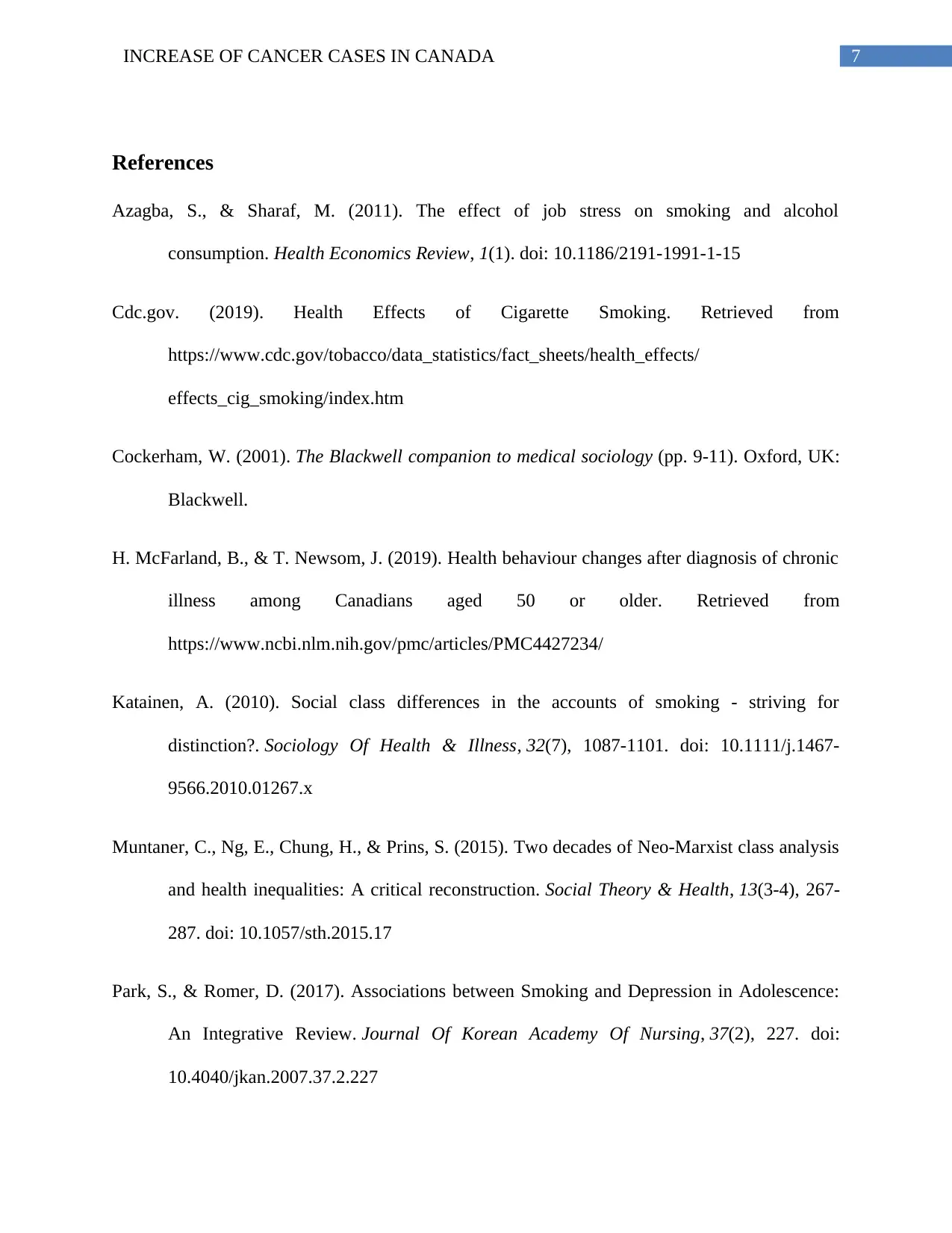
7INCREASE OF CANCER CASES IN CANADA
References
Azagba, S., & Sharaf, M. (2011). The effect of job stress on smoking and alcohol
consumption. Health Economics Review, 1(1). doi: 10.1186/2191-1991-1-15
Cdc.gov. (2019). Health Effects of Cigarette Smoking. Retrieved from
https://www.cdc.gov/tobacco/data_statistics/fact_sheets/health_effects/
effects_cig_smoking/index.htm
Cockerham, W. (2001). The Blackwell companion to medical sociology (pp. 9-11). Oxford, UK:
Blackwell.
H. McFarland, B., & T. Newsom, J. (2019). Health behaviour changes after diagnosis of chronic
illness among Canadians aged 50 or older. Retrieved from
https://www.ncbi.nlm.nih.gov/pmc/articles/PMC4427234/
Katainen, A. (2010). Social class differences in the accounts of smoking - striving for
distinction?. Sociology Of Health & Illness, 32(7), 1087-1101. doi: 10.1111/j.1467-
9566.2010.01267.x
Muntaner, C., Ng, E., Chung, H., & Prins, S. (2015). Two decades of Neo-Marxist class analysis
and health inequalities: A critical reconstruction. Social Theory & Health, 13(3-4), 267-
287. doi: 10.1057/sth.2015.17
Park, S., & Romer, D. (2017). Associations between Smoking and Depression in Adolescence:
An Integrative Review. Journal Of Korean Academy Of Nursing, 37(2), 227. doi:
10.4040/jkan.2007.37.2.227
References
Azagba, S., & Sharaf, M. (2011). The effect of job stress on smoking and alcohol
consumption. Health Economics Review, 1(1). doi: 10.1186/2191-1991-1-15
Cdc.gov. (2019). Health Effects of Cigarette Smoking. Retrieved from
https://www.cdc.gov/tobacco/data_statistics/fact_sheets/health_effects/
effects_cig_smoking/index.htm
Cockerham, W. (2001). The Blackwell companion to medical sociology (pp. 9-11). Oxford, UK:
Blackwell.
H. McFarland, B., & T. Newsom, J. (2019). Health behaviour changes after diagnosis of chronic
illness among Canadians aged 50 or older. Retrieved from
https://www.ncbi.nlm.nih.gov/pmc/articles/PMC4427234/
Katainen, A. (2010). Social class differences in the accounts of smoking - striving for
distinction?. Sociology Of Health & Illness, 32(7), 1087-1101. doi: 10.1111/j.1467-
9566.2010.01267.x
Muntaner, C., Ng, E., Chung, H., & Prins, S. (2015). Two decades of Neo-Marxist class analysis
and health inequalities: A critical reconstruction. Social Theory & Health, 13(3-4), 267-
287. doi: 10.1057/sth.2015.17
Park, S., & Romer, D. (2017). Associations between Smoking and Depression in Adolescence:
An Integrative Review. Journal Of Korean Academy Of Nursing, 37(2), 227. doi:
10.4040/jkan.2007.37.2.227
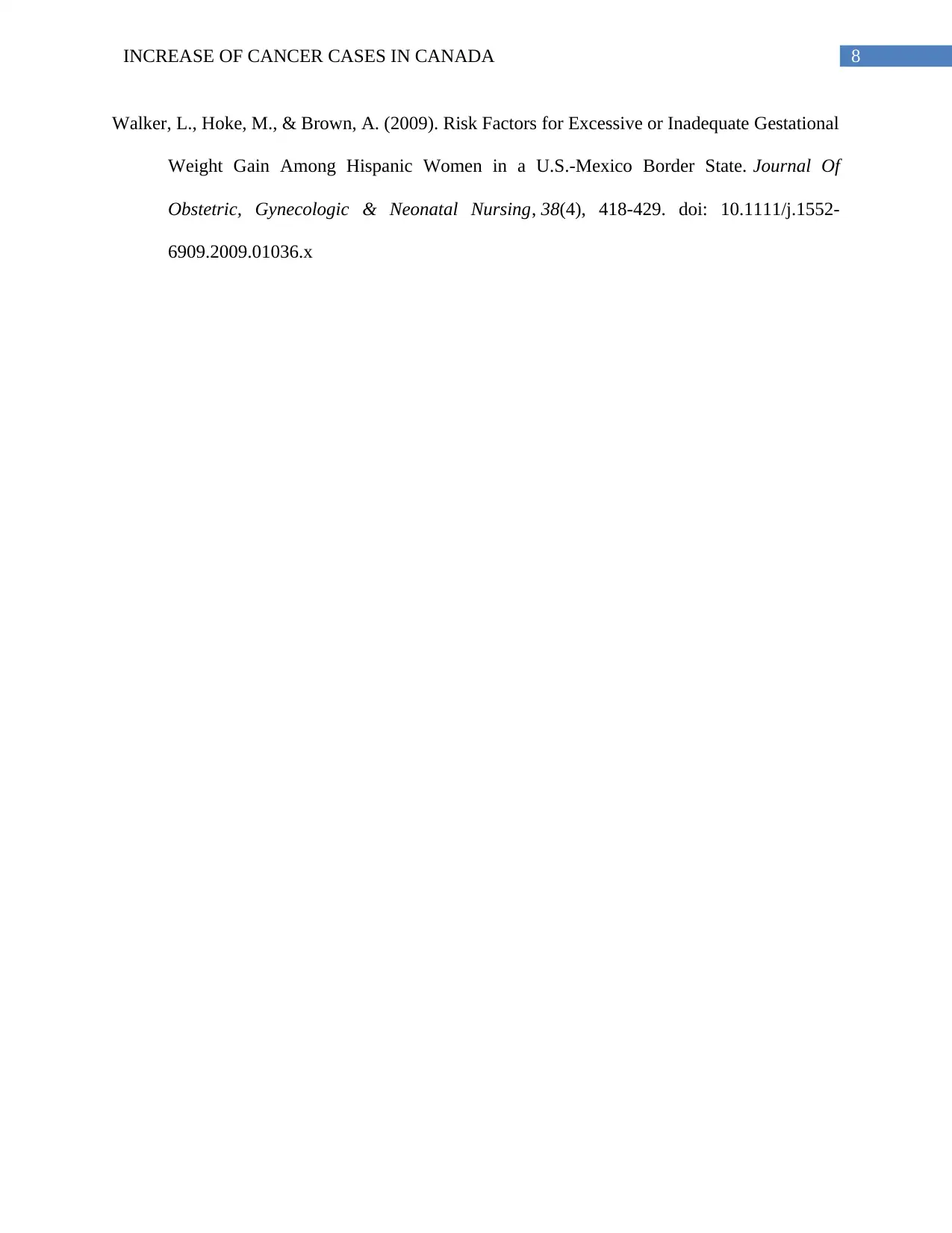
8INCREASE OF CANCER CASES IN CANADA
Walker, L., Hoke, M., & Brown, A. (2009). Risk Factors for Excessive or Inadequate Gestational
Weight Gain Among Hispanic Women in a U.S.-Mexico Border State. Journal Of
Obstetric, Gynecologic & Neonatal Nursing, 38(4), 418-429. doi: 10.1111/j.1552-
6909.2009.01036.x
Walker, L., Hoke, M., & Brown, A. (2009). Risk Factors for Excessive or Inadequate Gestational
Weight Gain Among Hispanic Women in a U.S.-Mexico Border State. Journal Of
Obstetric, Gynecologic & Neonatal Nursing, 38(4), 418-429. doi: 10.1111/j.1552-
6909.2009.01036.x
⊘ This is a preview!⊘
Do you want full access?
Subscribe today to unlock all pages.

Trusted by 1+ million students worldwide
1 out of 9
Related Documents
Your All-in-One AI-Powered Toolkit for Academic Success.
+13062052269
info@desklib.com
Available 24*7 on WhatsApp / Email
![[object Object]](/_next/static/media/star-bottom.7253800d.svg)
Unlock your academic potential
Copyright © 2020–2026 A2Z Services. All Rights Reserved. Developed and managed by ZUCOL.





